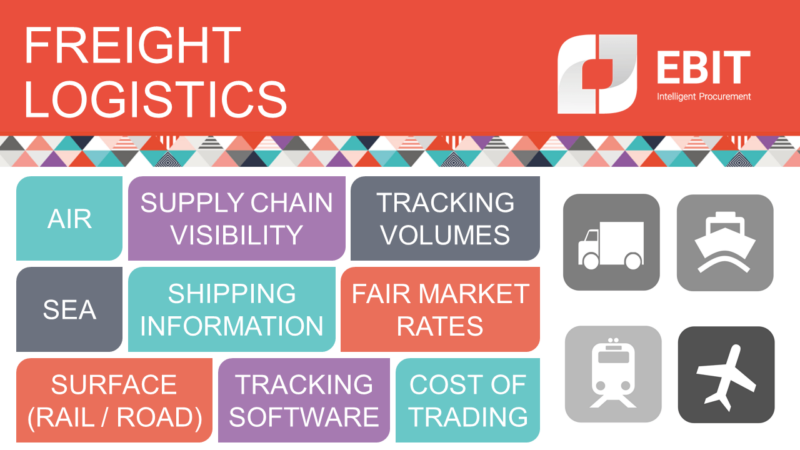Spend category highlight: Freight logistics
Freight Logistics covers the movement of purchased goods across a company’s supply chain. Goods are transported from the place of manufacture to the supplier’s warehousing depot to arrive when needed. These goods can travel by air, sea, road or rail, or a combination of these.
There are numerous freight logistics suppliers in the market, ranging from a few large players to a multitude of smaller companies. Whilst all of these companies appear to offer a service that will maximise stock availability, it is important to closely inspect the service offered as it may not offer the most cost-effective solution to your business or the best software suites to track your goods.
Ebit’s experience with freight logistics
Whether it’s working with a sole freight forwarder or numerous suppliers across multiple geographies, most clients we have worked with are already happy with the service they are receiving. Many have previously been to market to test pricing. That said, we have found that a review of current practice is likely to reveal a number of potential improvements. At worst case, a freight logistics review could confirm that you are paying fair market rates, are working with effective software and have full visibility of your supply chain.
How would Ebit approach a freight logistics project?
- Understand the geographic volumes and the split between air, sea and surface transport. Investigate whether this can be improved to increase percentage of goods sent at lower cost by sea freight.
- Investigate the level of shipping information currently available at container level/SKU. How visible is this information to buyers and the warehouse and freight management team?
- If real time visibility of SKUs and smart analytics are not available, ways of providing this can be explored. We would suggest processes are introduced where the supply chain is managed by exception and visible to all stakeholders involved in the supply chain.
- Investigate container fill rates, supplier collaboration and ways to maximise automation.
- Obtain comparative pricing from several freight forwarders including options to fix rates and/or work on spot rates.
- Review landed costs and suggest ways to minimise these costs without increasing risk.
- Understand the cost of trading in terms of the complexity and volume of invoicing and documentation and suggest ways to improve this.
The aim of a project would be to improve your control of your supply chain, giving it agility and making it easier to adapt to changes in supply and demand. It should also release employees to work in a more strategic way.

Get in touch to find out how Ebit can help your business effectively manage freight logistics.

